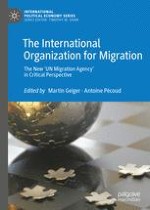2020 | OriginalPaper | Chapter
4. Drivers of Expenditure Allocation in the IOM: Refugees, Donors, and International Bureaucracy
Authors : Ronny Patz, Svanhildur Thorvaldsdottir
Published in: The International Organization for Migration
Publisher: Springer International Publishing
Activate our intelligent search to find suitable subject content or patents.
Select sections of text to find matching patents with Artificial Intelligence. powered by
Select sections of text to find additional relevant content using AI-assisted search. powered by
